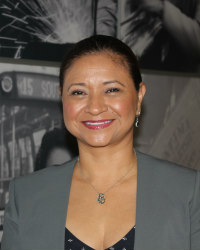César Chávez was the organizer of the Chicano Movement in the United States and founder of the United Farm Workers. Every year the UMKC Division of Diversity and Inclusion invites a leader to give the César Chávez Lecture. The presentation is designed to honor the accomplishments of Chávez and to inspire others to continue the legacy of his tireless, nonviolent leadership in ways they feel passionate so that more people can live with dignity and experience equal civil rights.

The speaker on April 8 was Yanira Merino, national president of the Labor Council for Latin American Advancement, which represents the interests of approximately two million Latino(a) trade unionists throughout the United States and Puerto Rico. In the spirit of César Chávez, Merino participated virtually and spoke about the many ways we are all fighting for a better life in the same country – the United States of America.
“You are never strong enough that you don’t need help,” Merino quoted from Chávez.
Chávez successfully used nonviolent tactics to organize farm workers against unfair labor practices and unhealthy working conditions that continue today as farm workers are exposed to harmful pesticides, dangerous equipment, hazardous “housing” and unfair wages. As a veteran labor and immigration rights leader and advocate, Merino fights in much the same way as Chávez.
Merino was born in El Salvador during a time of political violence and civil war. Merino shared her family’s struggle in the 1970s when they fled El Salvador for the United States. It was during this time Merino developed a passion for seeking justice for workers in El Salvador and those who fled for the United States. Merino’s family experienced separation, deportation and flight back to the United States as undocumented immigrants. Merino shared her feelings of fear, living undocumented, similar to the fear experienced by many today.
Merino worked many jobs in Los Angeles as an undocumented individual and knows, first-hand, what it is like to live in fear of deportation but with the hope for a better future. Perseverance is what kept Merino on the path to advocating for justice and equality. The working conditions at her places of employment were not good. But like Chávez, Merino learned the importance of working together. She and fellow workers were inspired to form a union. Despite being fired twice and working for a company that divided its employees, the union organized with Merino’s leadership. Within six months they had a contract and they stayed united. Merino recommended today’s youth look at history and learn about the labor movement, unions and how the middle class was created.
“Embrace our past,” she said. “Embrace our contributions. Embrace where we are going together.”
The labor unions play an important part in the building of the middle class, according to Merino. Unions lobby for wages and benefits. The ability to make more money gives people the chance to save money, buy homes, send children to school.
How can others speak out and overcome the barriers when you are the only one? Merino said move forward, as Chavez always talked about, know that you are speaking for everyone else.
Merino’s advice for those who want to see change is to get involved, remember change doesn’t happen overnight and it’s not easy. She said to build bridges between communities, find similarities, put together policies that benefit all, work with younger generations to understand that moving forward is up to everyone, work with churches, work with elected officers and elect people who look and think like you do.
“This is not only my fight, it’s our fight,” Merino said. “At the end of the day, we’re all fighting for democracy and this nation. When we connect as people, as workers…we achieve this.”
The lecture was moderated by Chris Hernandez, chief spokesman for the City of Kansas City, Missouri, and director of the City Communications Office. UMKC student Daphne Posadas introduced Merino and Hernandez.
